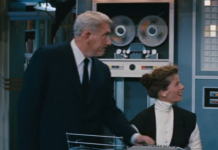 Resource Shelf has a great summary of this article:
Resource Shelf has a great summary of this article:
Great headline to gain the attention of readers. The article focuses on multiple digitisation projects taking place at the National Library of Wales and includes comments on why libraries should be involved in digitisation projects vs. Google.
Roy Cellan Jones writes:
What’s the point of a library or a librarian in the digital era? Who needs a physical space for books and archives, and librarians to police their use, when all that material will soon be available to anyone with a decent internet connection at the click of a mouse?
On a visit to the National Library of Wales in Aberystwyth last week, I got a few answers to those questions. This is one of the UK’s copyright libraries, able to ask for a copy of every book, newspaper and magazine published in the UK.
[Clip]
The National Library is not however just sitting back and waiting for a graceful demise. It’s plunging with enthusiasm into a massive digital project which could give it a sustainable future. A third of the staff now have roles in this project, so there’s now a range of perhaps unfamiliar job titles, from Imaging Officer to Metadata Manager.
What they are engaged on is extremely ambitious, as Andrew Green, the Welsh-speaking Yorkshireman who runs the place, explained to me as we toured the building. The idea is to give free online public access to as much as possible of what he describes as “the printed heritage of Wales” from the 16th Century to the present day. So every book, periodical or pamphlet could end up online.
[Clip]
So why does not Andrew Green just hand over his digital plans to Google, and let a commercial company bear the cost rather than the public purse? The librarian puts powerfully his case against the privatisation of our printed heritage. “The people of Wales own this collection, they have paid to build it up over the years, why should it just be handed to Google?”
He points out that commercial companies – even those as powerful as Google – can come and go, while the National Library of Wales is likely to be around in the 22nd Century.
The librarian believes he has found a new cause for his profession, to give a secure home to digitised texts produced with the highest quality standards and available freely to all. “These are huge benefits,” he says, “and should be fought for by all of those who care about unimpeded public access to knowledge.” Google beware – the librarians are getting cross, and they are quiet but patient people.
Perhaps the most difficult concept that Mr. Green shares is possibility that companies come and go even Google.
Access the National Library of Wales; Make Sure to Take a Look at the Digital Mirror


































Why do we need libraries and librarians in a digital age? For the same reason we need physicians and pharmacists when we have online medical references and could have drugstores shipping anyone any drug on demand. The Wales library is right. We need expertise, so we don’t waste our time or do something stupid.
This is what ticks me off the most about the geeky, crypto-autistic world of Google, of Amazon, and of many other techno-nerds. They confuse size with significance and gadgets with ability. They lack taste and judgment, much less wisdom. As Oscar Wilde put it, they’re people who know “the price of everything but the value of nothing.”
The astronomer Carl Sagan used to talk about “billions and billions of stars,” as if sheer numbers made his rehash of the anti-human and overtly racist “Kosmos” philosophy of Ernst Haeckel any less foul. In much the same fashion, Google and their kin think putting billions and billions of bytes in some vast database creates a great repository of wisdom. They worship at the altar of sheer size.
It doesn’t. Ten good books in whatever form will always outweigh the value of a million trashy ones posted online, fully indexed and searchable. We should give proper respect to those who can help us find those ten good books.
Me thinks you worry too much about size and miss the point of availability. In many parts of Canada and the western US a person can easily travel 100 miles to find the nearest library. In other parts of the world one might imagine much, much longer travel. Then what one finds is a small, limited collection. On the other hand, thanks to companies such as Google, at the touch of a few keys the world of knowledge becomes available.
What the National Library of Wales or any library does to digitally record their collection is a laudable preservation, but very much like a little child who clutches a favorite teddy to their chest and cries, “Mine! Mine!” They are willing to share, but only with a select few.
An addendum to my previous remarks. While libraries wish to maintain the ideal of free access, their resources are limited (as they have always been) and will eventually yield to economic pressure. They will find a need to charge for access. The “common” man will be excluded. Whereas a commercial company such as Google has almost unlimited access to funding through commercial enterprise and will therefore be able to provide knowledge to all at no cost to the user.
For years librarians have been the “gatekeepers” of the knowledge industry, hopefully they will have a similar role in the future. Although our young scholars seem to know how to access information on the internet, it was my experience watching them “google” away and simply selecting links based on front page views to cut and paste “research” papers and hand them in without thinking twice about individual reflection and analysis.
Our future depends on the ability of students of all ages to combine resources and create new concepts and ideas from the old. Librarians have had the role in the past of assisting them to make judgmental decisions of data which is often inaccurate or swayed by personal prejudice. Information is rarely “pure” and needs to be analyzed before committing it to one’s own publication.
There can be millions of Google books out there, but if there is no one to help in the selection of materials for further use, scholars in the future will have simply blind reckoning to depend upon unless they have been guided in the development of skills which will help them discriminate between the “chaff and the wheat”.